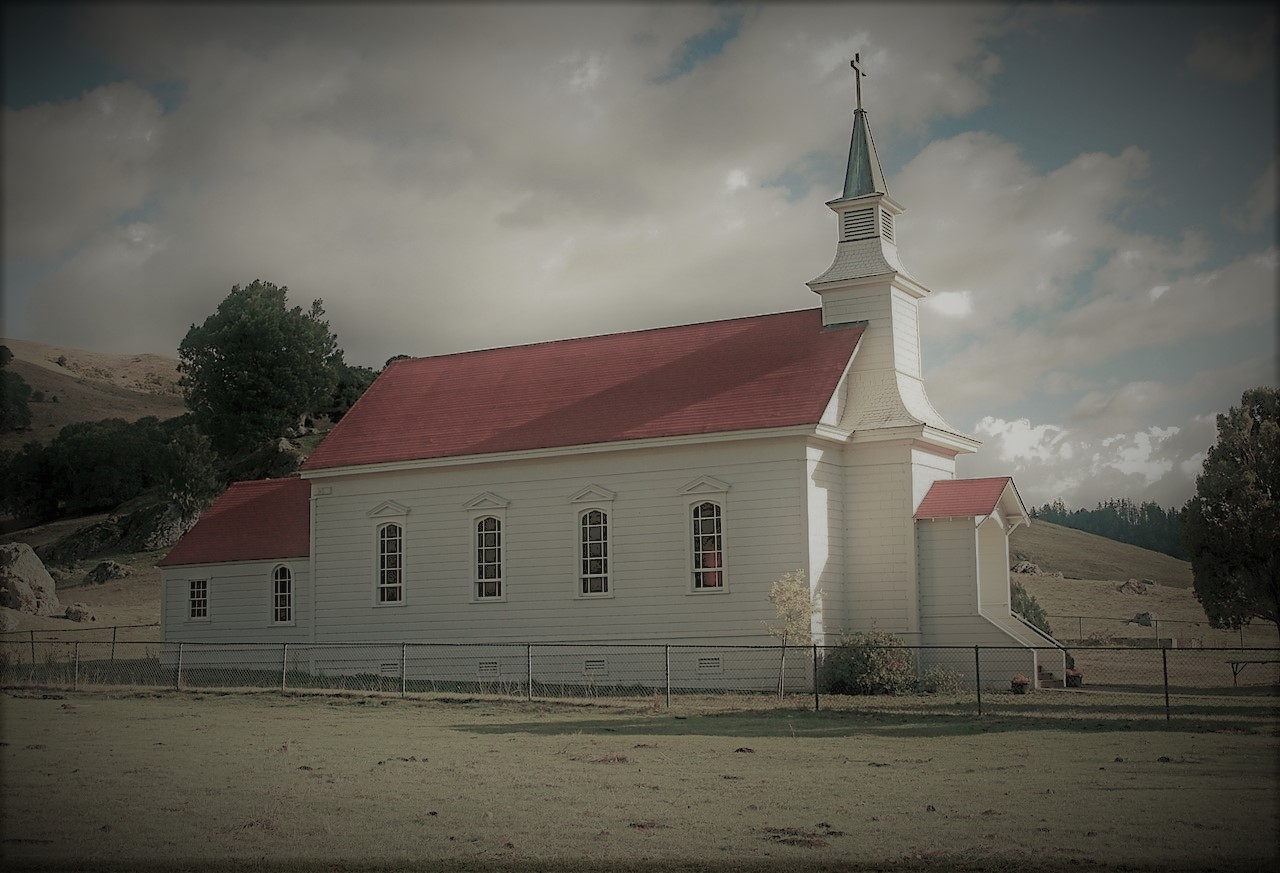 As I drove away I thought, “My faded memories of yesterday are real, not just bad nightmares from so long ago.” I had gone back to the town and to the church building where I was the pastor many years ago. I remembered my high hopes and great excitement for the new ministry opportunity. I absolutely loved being a pastor and desired to accomplish great things for the Lord. Everything in my life suddenly turned upside down while there, however, rivaling any bad dream of my past.
As I drove away I thought, “My faded memories of yesterday are real, not just bad nightmares from so long ago.” I had gone back to the town and to the church building where I was the pastor many years ago. I remembered my high hopes and great excitement for the new ministry opportunity. I absolutely loved being a pastor and desired to accomplish great things for the Lord. Everything in my life suddenly turned upside down while there, however, rivaling any bad dream of my past.
I also felt a deep sense of peace and calmness in my heart on my way back home. Yes, the trials were exceedingly painful and severe, but the Lord had delivered me through all of them. The restoring process was quite long, but Jesus has healed me from all the wounds and resulting fears and panic attacks.
During the long healing process, I wrote the story below for myself, to focus my thoughts on the future rather than on what had happened in my past. Perhaps this is why biblical prophecy remains such a passion of mine; it continues my focus on the future.
Here is what I wrote about 25 years ago:
____________________
The Land of What Will Be
The past is a lonely place. We so often journey to this land by ourselves, relive its memories in the solitude of our minds, and linger there, thinking about what might have been.
This barren land of What Might Have Been bears a striking resemblance to Neverland where Peter Pan fled to escape reality. Like boys refusing to grow up, we so often refuse to let go of the faded dreams of our past, now only a faint memory. We tenaciously hold on to the past not realizing that there is only air in our hands. I know; I have visited this deserted isle many times.
Our stay in the land of What Might Have Been is risky. There the pirate of our souls attacks us with his sharp arrows:
“You fool! You should have known better.”
“HA! You got what you deserved.”
“You are the guilty one!”
“It's all your fault, you know, you should have seen it coming.”
And on it goes in the land of What Might Have Been. No overgrown boy in tights flies to our rescue in this realm. We are there seemingly all alone, feeling the pain, shouldering the burden, and soaking our pillows with tears.
Failed plans, broken relationships, crushed dreams, and telephone conversations with old friends can all take us back to this desolate isle where hard as we might try, nothing changes.
There is another land, however, called What Will Be. It’s a joyful place. Those burdened with the past rarely feel the great joy and happiness of this brighter shore.
Two Men on a Journey
There were two men, however, who with help were able to leave the barren land of What Might Have Been and experience the joy of the land of What Will Be.
As we join these men traveling to their home in the early evening, we notice their heads hanging low. They are despondent, like many of us at times. As tears run down their cheeks, they rehearse the events of the past few days. The one who was to save their nation had been killed, put to death as a common villain.
“If only . . . . If only he had lived. What would it have been like? Freedom from bondage. A safe home for our people. If only he were still alive. Can you imagine how great that would be?”
As they languished in the land of What Might Have Been, a familiar stranger approached from behind and asks, “What are you guys talking about?”
“Are you the only one in this country who does not know what has happened these past several days, how Jesus of Nazareth was betrayed and put to death?” they reply. “Now, to make matters worse, women have visited his tomb and reported that it is empty. They say an angel told them that He is alive. What could have happened to the body?”
Undaunted, the stranger becomes their teacher explaining the ancient Scriptures to them. “The prophets clearly foretold that the Messiah would have to suffer first, and then enter into His glory,” He tells them. Beginning with Moses, he then proceeds to give them a course on Old Testament prophecy far surpassing all that had ever been given since that time.
As the two men approach their home, they feel their hearts burning with hope. They invite the stranger in for supper; and there, as He gives thanks and breaks the bread, they recognize Him.
“This is our Master. He is alive! He has risen from the dead! He is here, in our home, eating at our table!”
As soon as these disciples recognized Jesus, He vanished. Immediately, they got up and raced back to Jerusalem, their feet barely touching the ground.[1]
Our Call to Hope
The same Savior who brought hope and joy to those saddened travelers so long ago knows all about our shattered dreams, crushed hopes, and troubled hearts. He comes alongside us in our pain and feels all the pangs of our loneliness.
Yet He also stands at the edge of the desolate land of What Might Have Been and bids us to leave this desolate territory.
It is not a call to fame and fortune, at least not in this life. We may discover that our circumstances do not change. They may even get worse. The disciples who reveled in the resurrection that first Sunday long ago would face years of persecution for their faith. Except for John who suffered banishment, they would all be put to death for proclaiming the resurrection.
What, then, is the appeal of the land of What Will Be? Hope!
This is not, however, the type of anticipation we think of when we express a desire that the weather will be sunny and warm tomorrow. It may storm all day or even snow.
This hope is certain. Our future joy is just as sure as Christ's resurrection, which guarantees it with absolute certainty for all those who know Him.
But how does this hope sustain us?
The Example of Jesus
Jesus Himself gives us the best illustration of how it works.
First, consider all that He endured. Betrayed by a trusted companion. Condemned in phony and illegal trials, although He had never done anything wrong His entire life. Denied by a close friend. Beaten, whipped, and mocked by the very men He had created. Nailed to a cross, the cruelest form of execution ever imagined. Scoffed and ridiculed while gasping for air on a cross full of splinters. And worse of all, separated from His beloved Father in heaven.
How did He survive all that? What kept Him from losing His mind? How was He able to forgive and reach out to others in midst of such cruel torture?
Hebrews 12:2 explains how He did it, “Let us fix our eyes on Jesus, the author and perfecter of our faith, who for the joy set before him endured the cross, scorning its shame, and sat down at the right hand of the throne of God.” Can you imagine a joy so great as to carry someone through all that torment, grief, and agony? Jesus could.
And the good news is that He is willing to share it with us. On the night He was betrayed, Jesus spoke of His home in heaven (the place of joy that sustained Him on the cross) and promised His followers that He would return to take them to a special place He was preparing for them inside that home.[2]
The glory of this future gathering in heaven caused the Apostle Paul to proclaim that the sufferings of this life were really nothing compared to the joy and splendor we will experience in eternity.[3] (If you think Paul had an easy life, read II Corinthians 11:23-33.) Jesus revealed to Paul that the future joy of eternity would make his enormous earthly afflictions seem small in comparison.
Our Eternal Hope
Our hope is this: Jesus has shed His own blood so that we might possess eternal life and enjoy a future joy far beyond anything we can imagine here on earth. And He has risen from the dead to demonstrate that this is no pie in the sky promise. It is real. It is certain. He is coming again.
Will we return to the land of What Might Have Been in a vain attempt to recapture failed dreams? Will we put our ultimate hope in earthly tomorrows that hold no certain promise except that they themselves may someday become candidates for the bleak realm of What Might Have Been?
Will we let Jesus transform our grief into joy as we look forward to the tremendous joys of eternity awaiting all who know Him as their Savior?
Or, will we place our trust in the One who has cancelled all the charges against us and promised us a certain and secure future, one that even the worst of circumstances on earth cannot destroy? Will we fix our eyes on eternity and let that gaze be our strength in a troubled world? Will we let Jesus transform our grief into joy as we look forward to the tremendous joys of eternity awaiting all who know Him as their Savior?
We have a choice. We can remain in the land of What Might Have Been and let the enemy of our souls ravage us with his relentless charges. Or, we can put our lives in the hands of a loving and gracious Savior who longs for us to experience the love, forgiveness, and joy He so freely offers to all who trust Him. The land of What Will Be is real and a place of overwhelming joy and all-encompassing hope.
____________________
This forward gaze to eternity sparked considerable healing in my life in the years after I wrote this story. This is one reason I am so passionate about writing about our hope. It’s not just a matter for theologians to debate, it’s something that redeems our troubled past, relieves our fears of the future, and gives us an unfailing hope for what lies ahead. This is why I write about our thrilling hope; it's so much more than theology to me!
Where is your ultimate hope today? Does it rest in this troubled and chaotic world or in Jesus and His promises of a glorious eternity?
[1]Luke 24:13-35
[2]John 14:2, 3
[3]Romans 8:18; 2 Corinthians 4:17, 18











 Last night I saw an extraordinarily good documentary called Genesis: Paradise Lost that was both informative and rich in proof of the Genesis account. I highly recommend this movie, which may be playing in a theater near you this coming Thursday night, November 16.
Last night I saw an extraordinarily good documentary called Genesis: Paradise Lost that was both informative and rich in proof of the Genesis account. I highly recommend this movie, which may be playing in a theater near you this coming Thursday night, November 16. Thomas Chisholm was born in a log cabin in Franklin, Kentucky in 1866. He became a believer at the age of 27 and a Methodist preacher at the age of 36 despite a lack of formal training for the ministry. Unfortunately, after only a year poor health made it impossible for him to continue as a pastor.
Thomas Chisholm was born in a log cabin in Franklin, Kentucky in 1866. He became a believer at the age of 27 and a Methodist preacher at the age of 36 despite a lack of formal training for the ministry. Unfortunately, after only a year poor health made it impossible for him to continue as a pastor. During our visit to Savannah, Georgia last year, my wife and I came across a painting, La Parabola, at the Telfair Academy for art. The painting, shown above, depicts the entire life of a woman in two separate panels. I felt a sense of sadness as I initially studied the painting.
During our visit to Savannah, Georgia last year, my wife and I came across a painting, La Parabola, at the Telfair Academy for art. The painting, shown above, depicts the entire life of a woman in two separate panels. I felt a sense of sadness as I initially studied the painting. The apostle Paul begins his list describing the characteristics of people who make up the “perilous times” of 2 Timothy 3 with the phrase “lovers of self.” Does this not sum up the Facebook generation? For many, posting is all about drawing attention to themselves, their lives, and their opinions. It’s all about making them look good. I have not been immune to this temptation myself.
The apostle Paul begins his list describing the characteristics of people who make up the “perilous times” of 2 Timothy 3 with the phrase “lovers of self.” Does this not sum up the Facebook generation? For many, posting is all about drawing attention to themselves, their lives, and their opinions. It’s all about making them look good. I have not been immune to this temptation myself. What comes to your mind when you think of a shepherd? For me, it’s wise guidance and protection. I see the shepherd guiding his sheep to a calm, clear lake for a refreshing drink of water and at other times fighting off the attack of a wolf. Perhaps this is why the Lord frequently refers to the leaders of His people in this way.
What comes to your mind when you think of a shepherd? For me, it’s wise guidance and protection. I see the shepherd guiding his sheep to a calm, clear lake for a refreshing drink of water and at other times fighting off the attack of a wolf. Perhaps this is why the Lord frequently refers to the leaders of His people in this way. “We appear to be suffering a great crisis of hope.” Those words, written by John Eldredge in his September 2017 newsletter, aptly sum up our nation today.
“We appear to be suffering a great crisis of hope.” Those words, written by John Eldredge in his September 2017 newsletter, aptly sum up our nation today. Obsession. I think that in many ways this describes the day in which we live. People become obsessed with an idea, interest, desire, or emotion and soon it dominates social media and the news as it consumes everyone’s attention. Everyone reading this post likely knows the nature of the current obsession.
Obsession. I think that in many ways this describes the day in which we live. People become obsessed with an idea, interest, desire, or emotion and soon it dominates social media and the news as it consumes everyone’s attention. Everyone reading this post likely knows the nature of the current obsession. As I drove away I thought, “My faded memories of yesterday are real, not just bad nightmares from so long ago.” I had gone back to the town and to the church building where I was the pastor many years ago. I remembered my high hopes and great excitement for the new ministry opportunity. I absolutely loved being a pastor and desired to accomplish great things for the Lord. Everything in my life suddenly turned upside down while there, however, rivaling any bad dream of my past.
As I drove away I thought, “My faded memories of yesterday are real, not just bad nightmares from so long ago.” I had gone back to the town and to the church building where I was the pastor many years ago. I remembered my high hopes and great excitement for the new ministry opportunity. I absolutely loved being a pastor and desired to accomplish great things for the Lord. Everything in my life suddenly turned upside down while there, however, rivaling any bad dream of my past. During the past several weeks, I have been writing about the resurrection and what it means regarding our beliefs about Jesus, His authority, His teaching, and His views of Scripture. I believe this represents a missing link both in the church and in our nation today. So many want to claim Jesus as a good teacher, but yet fail to believe what He says about so many things. Many Christians worship Him while at the same time expressing disbelief in many of His teachings.
During the past several weeks, I have been writing about the resurrection and what it means regarding our beliefs about Jesus, His authority, His teaching, and His views of Scripture. I believe this represents a missing link both in the church and in our nation today. So many want to claim Jesus as a good teacher, but yet fail to believe what He says about so many things. Many Christians worship Him while at the same time expressing disbelief in many of His teachings. When I first heard the expression, my immediate thought was “that’s it!” This fits perfectly with what I see.
When I first heard the expression, my immediate thought was “that’s it!” This fits perfectly with what I see.